In Japanese, the phrase kono ore da! この俺だ! translates literally to "it's this me!" But that sounds weird in English. So, in this post, I'll explain what kono ore means and how it works.
How It Works
To understand how kono ore works, all you have to do is take a look at a different, but similar phrase:
- ano densetsu no Yamada Tae ga fukkatsu shita dato?!
あの伝説の山田たえが復活しただと?!
That legendary Yamada Tae has resurrected, [you] said?! - ano Yamada Tae ga?!
あの山田たえが?!
That Yamada Tae [has]?! - ano Yamada Tae?!
あの山田たえ?!
THAT Yamada Tae?!
As you can see, when we use ano あの, "that," this way, we're often talking about how impressive someone or something is. We are saying THAT one? And not another one that happens to have the same name? THAT one?
Similarly, in Japanese you can use kono ore この俺 to refer to yourself, because kono この refers to things close to the speaker and there's nothing closer to the speaker than the speaker himself.
In which case it would be THIS me, and not anyone else. To understand it we'd need more context. Generally, it's only used a way to imply contrast. That is, I have done all this stuff, or I am this way, so it can't, or shouldn't, be that something like this happens to someone like me.
- kono ore ga kyoufu shiteru dato?!
この俺が恐怖してるだと?!
This me is terrified?!
(i.e. I'm terrified? Impossible! I'm a hero who has fought thousands of battles, bested countless foes, faced death infinite times, AND EMERGED VICTORIOUS. You're telling this me, that is, someone like this which I am, would be terrified?! SONNA BAKA NA!!!11)
Hint of Self-Importance
In manga and anime, kono ore da, kono ore ga, kono ore ni, kono ore wo, and so on are often used by self-important, pompous, or narcissistic characters who're full of themselves, as a way to imply: THIS me is saying it, not just any wimpy, riff-raff, side-character. THIS me is.
Kono Ore, Kono Watashi, Kono Boku
As one would expect, different first person pronouns can be used (ore, watashi, boku, watakushi). But in manga each of those pronouns is normally associated with a different type of a character. Basically:
- kono ore
この俺
Probably some buff dude.
Thinks he is the strongest.
Cares about turf.
Pulls rank. - kono watashi
この私
A woman who's full of herself.
Or some businessman who's also full of himself.
Or a rich girl who's full of herself, a.k.a. ojousama お嬢様. - kono boku
この僕
A rich boy, a.k.a. bocchan 坊っちゃん. - kono watakushi
このワタクシ
A classy character.
A rich girl.
A butler or maid that works for a rich character.
Examples
For reference, a couple of examples of kono ore being used in manga.
Kono Ore Da この俺だ
- nanika
you deshou ka?
何か 用でしょうか?- [You want something?]
- [Anything you want to discuss?]
- [What's the matter?]
- hanashi wo
ima shite'n-no wa kono ore da'!
話を 今してんのは (space) このオレだッ!- [The one] talking [right] now is this me!
- I am [the one] talking [right] now!
- dare ga shitsumon shite ii to itta'!?
誰が質問していいと言ったッ!?
Who said it was alright to ask questions!? - kono boke ga'!
このボケがッ!- "This idiot!"
- [You] idiot!
Kono Ore Ga この俺が
- nasakenai
yatsu da
なさけない やつだ・・・・・・
[What a] pathetic guy.
(referring to a guy who just lost to Kakarot.) - masaka
ano Kakarotto aite ni
kono ore ga wazawaza
ugoku koto ni
naru towa na......
まさか あのカカロットあいてに このオレが わざわざ 動くことに なるとはな・・・・・・
[It's unbelievable that]
against that Kakarot
I (kono ore) would have to [fight.]
(i.e. Vegeta didn't expect it would need his super-superior powers to beat a small-fry like Kakarot.)
Kono Ore Yori この俺より
- Gohan
jishin wo mote...
悟飯 自信をもて・・・
Gohan, have confidence. - omae ga
sono ki ni nareba
おまえが その気になれば
[If] you [felt like it] - kono ore yori
pawaa wa ue da......
このオレより パワーは上だ・・・・・・- [Your] power [would] be up from this me......
- [Your] power [would] be above [mine]......
Kono Ore-sama この俺様
The word ore-sama 俺様 is an even more ridiculously self-important term that nobody would use seriously. It's combines ore with the honorific suffix ~sama ~様.
Normally, you would never use a honorific on yourself, but self-important characters do this because self-important characters don't care. They think they're that important.
- ko' kono
ore-sama ga
taishita koto
nai dato......!!!!
こっ この オレさまが たいしたこと ないだと・・・・・・!!!!
Th-- this me isn't [a big deal], [you] say......!!!! - sou da
そうだ
[That's right.] - ima no kougeki de
wakatta
いまの攻撃で わかった
With [that] attack [just] now [I] realized.
(Goku figured Nappa isn't a big deal from how weak his attack was.)
- ima sara
kono ore-sama no
osoroshi-sa ni
kidzuite-mo
oso-sugiru ze...?
今さら この俺様の 恐ろしさに 気づいても 遅すぎるぜ・・・? - Even if [you finally] noticed how frightening this me is, it's [already] too late.
- ima sara 今更
Only now. After all this time. Finally. - osoroshi-sa 恐ろしさ
Frightening-ness. How frightening. - kidzuku 気づく
To notice. - kidzuite-mo 気づいても
Even if [you] notice. - osoi 遅い
Late. - oso-sugiru 遅すぎる
Too late.
- ima sara 今更
Kono Boku この僕
- Fantomuhaibu-ke
toushu wa
ファントムハイブ家 当主は
The head of the Phantomhive family... - ”Shieru-Fantomuhaibu (kono boku)*” da
”シエル・ファントムハイブ(この僕)”だ
is "Ciel Phantomhive (this me)*."
(*a gikun 義訓, different word written as furigana.)
Kono Watashi この私
- mattaku
全く
[Good grief.] - gesewa na gumin-domo
全く下世話な愚民共
[What a lot of prattling fools.]- gesewa na 下世話な
[Someone] who chit-chats, prattles. - gumin 愚民
Foolish people.
- gesewa na 下世話な
- kono watashi wo dare dato omotteru no?
この私を誰だと思ってるの?
Who do [they] think this me is?
- Who do they think I am?
Kono Watakushi このワタクシ
- Context: Furutani Himawari 古谷向日葵 competes with Oomuro Sakurako 大室櫻子 for the student council presidency.
- makemasen wa yo
負けませんわよ
[I] won't lose. - {jiki seitokai fukukaichou ni naru} no wa kono watakushi desu wa!
時期生徒会副会長になるのはこのわたくしですわ!
The one [who] {will become the next student council vice-president} is this me!
It's I [who] {will become the next student council vice-president}. - wa, watashi datte makenai mon!
わ 私だって負けないもん!
I-I won't lose [either]! - toiuka Himawari niwa makenai kara'
というか向日葵には負けないからっ
Or rather, [I] wouldn't lose to [you], Himawari. - ugugu'
うぐぐっ
*frustration* - aikawarazu {namaiki na} ko desu wa
相変わらず生意気な子ですわ
As always, [you] are an {impertinent} child. (literally.)
[You] are impertinent as always.
Kono (Insert Name Here)
Besides first person pronouns, sometimes the character's own name is used after the kono. This doesn't carry the same childish nuances that using one's own name as pronoun normally would have. See:
- temee nanka ga
kono Nappa-sama ni
kanau wake ga nai-n-da!!!
てめえなんかが このナッパさまに かなうわけがないんだ!!!
[There's no way someone like] you [can defeat] THIS NAPPA-SAMA!!!- kanau 叶う - can mean "to rival" sometimes, as in, "can defeat," since someone unrivaled is undefeatable.
And, of course, we can't forget the classic:
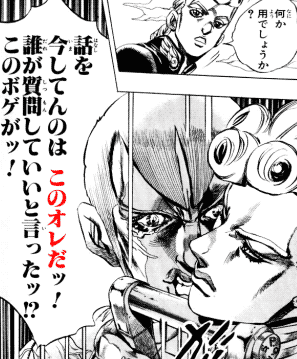
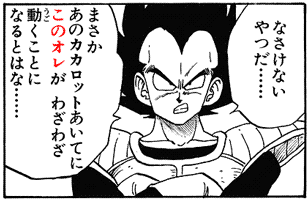
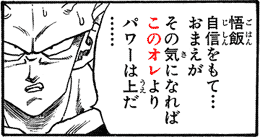
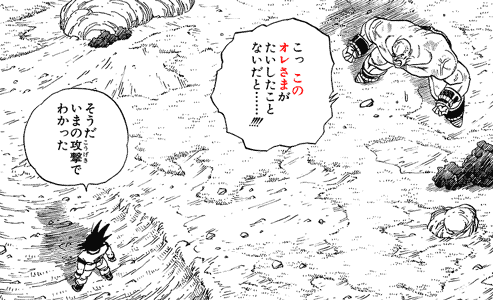
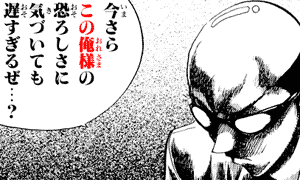
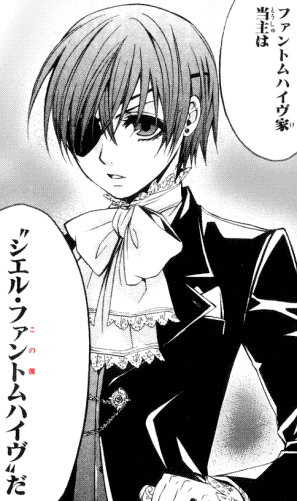
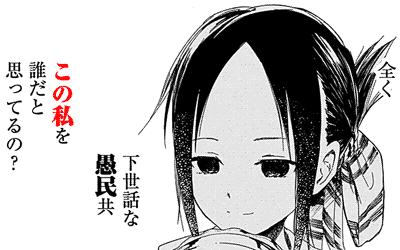
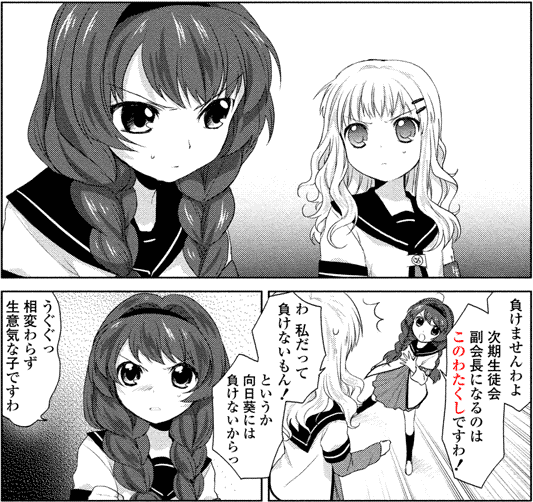
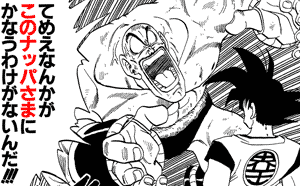
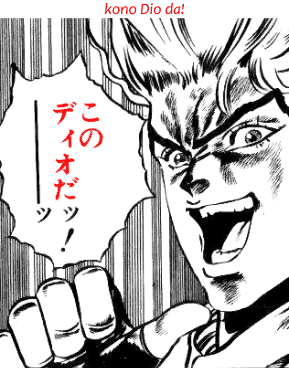
No comments: